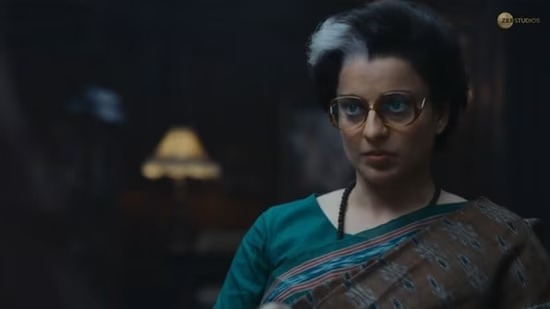Kangana Ranaut’s much-anticipated film “Emergency,” directed, produced, and written by her, faced a significant legal setback when the Bombay High Court refused to order the Central Board of Film Certification (CBFC) to immediately issue a certification. The movie, based on the controversial Emergency period in India under former Prime Minister Indira Gandhi, was set to release on September 6, 2024. However, objections from Sikh organizations regarding the film’s portrayal of historical events led to a delay in its certification, resulting in its release being postponed. This article delves into the reasons behind the court’s decision, the objections raised, and the broader implications for freedom of expression in Indian cinema. “Emergency” is set against the backdrop of the 1975 Emergency imposed by then-Prime Minister Indira Gandhi, a period often regarded as one of the darkest in Indian democratic history. The film aims to depict this tumultuous period, highlighting the suspension of civil liberties, political crackdowns, and the impact on the common people. Kangana Ranaut, who has often been vocal about her political views, plays the role of Indira Gandhi, attempting to portray her complex persona during a highly controversial time. The release of “Emergency” hit a major roadblock when Sikh organizations, including the Jabalpur Sikh Sangat and Sri Guru Singh Sabha, raised concerns about the film’s content. These groups argued that certain scenes in the movie misrepresented historical facts, particularly in relation to the Sikh community. They claimed that the film not only distorted history but also infringed upon the fundamental rights of the Sikh community. As a result, these organizations sought a ban on the film and demanded an apology from Kangana Ranaut. The Shiromani Akali Dal, a prominent Sikh political party, also stepped in, sending a legal notice to the CBFC urging it to withhold the film’s certification until the issues were addressed. On September 3, 2024, the Bombay High Court heard a plea from Zee Studios, the co-producer of “Emergency,” which sought urgent relief by requesting the court to direct the CBFC to issue the certification without delay. However, the court refused to comply, citing the earlier order from the Madhya Pradesh High Court, which mandated that the CBFC first address the objections raised by the Sikh organizations before issuing a certificate.
The two-judge bench underscored the importance of judicial propriety, stating that it could not override the decision of another high court. The judges also noted the substantial financial investments made in the production of the film, emphasizing that the matter should not be left unresolved indefinitely. Despite acknowledging the significant monetary stakes involved, the court held firm in its decision, directing the CBFC to resolve the objections by September 18, 2024. During the court proceedings, the CBFC’s counsel sought additional time, citing the upcoming Ganpati festival as a reason for the delay. However, the court dismissed this justification, stressing that the certification process could not be further postponed due to external factors. The court criticized the CBFC for not working efficiently and emphasized that festivals should not be used as grounds for delaying official duties. The CBFC, on its part, stated that it had not yet issued a final certification due to the pending objections and ongoing legal disputes. This situation left the film’s release date in limbo, further complicating matters for the filmmakers who had already invested crores of rupees into production and marketing efforts. The court’s refusal to expedite the certification process for “Emergency” highlights the ongoing struggle between filmmakers’ right to freedom of expression and the sensitivities of various communities. While the CBFC is tasked with ensuring that films adhere to cultural and moral standards, the intervention of external groups in the certification process raises questions about the extent to which artistic freedom is protected in India. Kangana Ranaut’s team reacted strongly to the court’s decision, accusing the CBFC of unlawfully withholding the film’s certification and alleging that political and communal pressures were influencing the board’s actions. Ranaut, known for her outspoken stance on political issues, has often faced criticism and legal challenges over her portrayals and commentary, which some argue cross the line between artistic license and historical accuracy. The controversy surrounding “Emergency” is not an isolated incident. Indian cinema has frequently been a battleground for debates on free speech, censorship, and historical representation. Films that touch upon politically sensitive subjects often face similar hurdles, as seen with movies like “Padmaavat” and “Udta Punjab,” where community backlash and political influence have played significant roles in shaping their final content and release schedules. The delay in “Emergency’s” certification also serves as a cautionary tale for filmmakers attempting to explore contentious historical or political narratives. It underscores the need for clearer guidelines and greater autonomy for the CBFC to function without undue external pressures, thus safeguarding the creative freedom of artists. The Bombay High Court’s refusal to order immediate certification for Kangana Ranaut’s “Emergency” highlights the complex interplay of legal, social, and political factors that influence film production in India. While the court’s decision is rooted in procedural propriety and respect for prior judicial orders, it also brings to the fore the challenges faced by filmmakers in navigating the sensitive terrain of historical representation. As the CBFC deliberates on the objections raised, the future of “Emergency” hangs in the balance, awaiting a resolution that will hopefully uphold both artistic expression and community sensibilities. The broader implications of this case continue to spark debate on the limits of creative freedom and the role of censorship in Indian cinema, making it a pivotal moment in the ongoing discourse on artistic rights and responsibilities.

